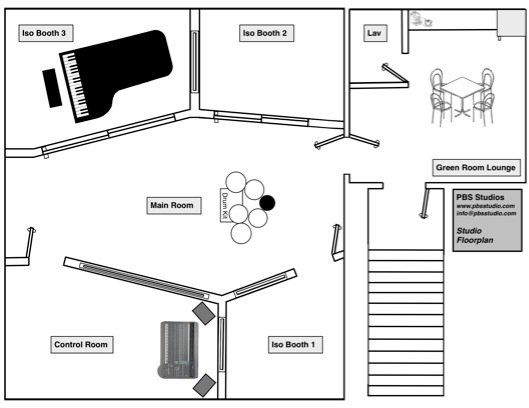- Produced by Earl MacDonald
- Recorded by Peter Kontrimas at PBS, Westwood, MA on Nov. 2 & 3, 2012
- Mixed & Mastered by Earl MacDonald & Peter Kontrimas at PBS.
In the liner notes of his “It Wasn’t Me” CD, Bruce Gertz refers to Peter Kontrimas as “a true gift to the jazz community.” Earl wholeheartedly concurs. Peter doubles as a recording engineer and professional string bassist. Because of his refined musicianship, Earl trusts him implicitly in the studio. He is no mere knob turner. Not only do Earl and Peter talk the same language, but Earl values and seeks his opinions.
This is the fourth CD project for which Earl has hired Peter. Previously he brought Peter to New Jersey when Earl recorded his big band project (“re:Visions“) at Bennett Studios, and had Peter record live concerts with his mobile console, in Hartford’s Bushnell Park and UConn’s Jorgensen Center for the Performing Arts. For this particular project C.O.W. recorded at Peter’s studio, PBS. Here is the studio’s floor plan:
Cellist Christopher Hoffman was situated in Isolation Booth 1, saxophonist Kris Allen played in Isolation Booth 2, Rogerio Boccato‘s extensive percussion setup was located in the main room, while Earl inhabited Isolation Booth 3, at the seven foot, Yamada C7 grand piano.
The tracking took place over two consecutive, 8-hour days, Nov. 2 & 3, 2012. At the end, an impressive thirty (30!) tunes were documented, which included three complete soundtracks for the collaborative suites with visual artists, Deborah Dancy and Ted Efremoff, and additional pieces. It is likely that some of the remaining tracks will be released on a subsequent, sequel disc.
On average, three “takes” were recorded of each composition. They then chose the best version(s) and “punched in” any corrections or missed notes. At PBS, everyone plays in individual glass isolation booths with their own adjustable headphone mixes, thereby facilitating fixes that wouldn’t be possible if everyone recorded in the same room.
Earl headed back to Connecticut on November 3rd with a stack of CDs with rough mixes of everything they recorded. For the next month and a half, he listened carefully, making notes regarding which takes and solos he liked best, and for things which he might try manipulating for improvement in the editing phase.
Peter and Earl worked on the editing and mixing over several months, sporadically, spanning January through March, 2013. In the editing process, phrases or even individual notes can be cut and pasted from alternate takes. If the tempos are the same, it is possible to take a stellar solo from an alternate take and plug it into the selected master. Much creativity, artistry, craftsmanship and time go into the editing process.
Mixing is (for Earl) the most difficult and exhausting aspect of the recording process. It generally takes him several stabs at it before he am satisfied. One might think the engineer could set the volumes for each instrument and then leave them, but that simply is not the case. Earl benefitted from the reactions of several friends and colleagues who listened carefully and patiently (Louis Hanzlik, Irma Vallecillo, Michael Verselli, etc.), and then adjusted accordingly. If time and budget were limitless, he might still be mixing, but overall Earl is elated with the sounds and balances achieved.
For musicians who are planning their next recording session, here is Peter Kontrimas’ contact information:
PBS Studios
Westwood, MA
info@pbsstudio.com
www.pbsstudio.com
Ph: 781.461.0696
PBS is conviently located just 10 miles South-West of Boston, near the intersection of I-95 and Route 1. Three minutes from the Route 128/Amtrak Commuter Station.

